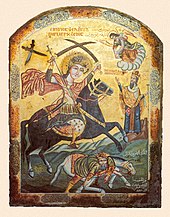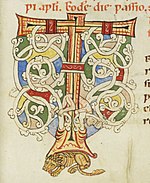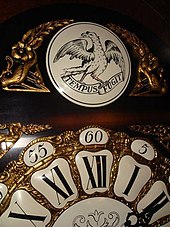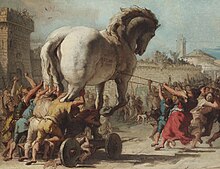List of Latin Phrases / T
Tabula
- Tabula gratulatoria
- "List of Congratulations"
- Tabula rasa
- “Empty tablet” - The Romans used to write on wax tablets, which were erased by smoothing out the wax with the flat end of the stylus ( stilus ). John Locke used the term to describe the human mind at birth, prior to the acquisition of any knowledge.
- Tabula votiva
- “ Votive panel ” - pictures often seen at pilgrimage sites depicting emergencies or miracles; also pictures of limbs in miniature form. The votive tablets are dedicated to God or a saint to express a request or thanks.
Taedium
- Taedium vitae
- "Tired of life"
Talis
- Talis qualis
- "As such"
Taliter
- Taliter qualiter
- "So so", "somewhat", "mediocre", also "as good as it can be" - examples: "every first and best of the best quality ".
- “To write down a German lexicon, I have long given up this silly idea; and now I would probably least seek it out again, since I see it carried out by someone else in taliter quality . From this taliter qualiter you will mean that I am not entirely satisfied with Adelung's work. ” Gotthold Ephraim Lessing to Karl Lessing , February 2, 1774.
Tam
- Tam deest avaro, quod habet, quam quod non habet.
- "The greedy lacks both what he has and what he does not have." - Publilius Syrus , Sententiae T 3.
- Tam similis est quam ovo ovum.
- "As similar as one egg to the next" - based on a formulation from the apocolocynthosis by the philosopher Seneca .
Tamen
- Tamen est laudanda voluntas.
- “Nevertheless, the will is to be praised.” - Shortened form of “ Ut desint vires, tamen est laudanda voluntas. “(“ Even if the strength is lacking, the will is still to be praised. ” Ovid , Epistulae ex Ponto 3, 4, 79).
tandem
- Tandem bona causa triumphat.
- “In the end, the good cause triumphs!” - inscription on the Paland house in the Borschemich district of Erkelenz . The inscription probably refers to the outcome of a long legal or inheritance dispute.
- Tandem patientia victrix.
- “Patience is finally the winner.” - This motto adorns one of the medals of the city of Osnabrück with pictures of the peacemakers from 1648.
- "Sit pax in terris tandem (et) patientia victrix." ("Peace be at last on earth and patience victorious.") Is the inscription on the so-called peace wish ducat from the city of Nuremberg from 1632.

Tandem vicisti: Julian is killed by St. Mercurius .
- Tandem vicisti, Galilaee.
- “In the end you won, Galilean.” - Allegedly the last words of the Roman emperor Julian , who had returned from Christianity to paganism. Jesus is addressed here as a “Galilean” . The saying is only attested in the 5th century by Theodoret , who wrote church history from a Christian perspective. The church father Jerome had already interpreted Julian's untimely death as a deserved punishment for his apostasy from Christianity.
Tantae
- Tantae molis erat Romanam condere gentem.
- "It was such hardship to found the people of the Romans." - Virgil , Aeneid 1,33.
Tantum
- Tantum deus intelligitur, quantum diligitur.
- "God is understood to the extent that he is loved."
- Tantum devolutum, quantum appellatum .
- "Passed on as far as challenged." - Describes the devolving effect of legal remedies.
- Tantum religio potuit suadere malorum.
- "Faith was able to advise so much evil." - Warning of religious madness in view of the sacrifice of Iphigenies before the Greeks left for Troy ( Lucretius , De rerum natura , 1,101)
Tarde
- Tarde venientibus ossa
- "The bones of those who come (too) late" - The rights are written for the bright, those who come too late are left with only bones. Corresponds to the German proverb "If you don't come at the right time, you have to see what's left."
- There is also a variant with Sero .
Taurum
- Taurum romps, qui vitulum sustulerit.
- “Whoever has raised a calf will carry a bull.” - This quote from Petronius alludes to Milon von Kroton , one of the most famous athletes (wrestlers) of antiquity. According to legend, he lifted a calf every day. As the animal grew, his strength grew until he was finally able to lift the adult bull.
Te
- Te Deum laudamus
- “We praise you, God.” - Beginning of a hymn of praise and thanks for the Catholic Church. According to legend, Saints Augustine and Ambrose of Milan are said to have composed this song together. He begins with the following words: “Te Deum laudamus. Te Dominum confitemur. Te aeternum patrem omnis terra veneratur. "(" Great God, we praise you, Lord, we praise your strength. The earth bends before you and admires your works. As you were before all time, so you remain forever. ")
- Te intus et in cute novi.
- “I know you inside and under your skin.” - Persius , Saturae 3,30.
- Actually a pleonasm: With in cute it is said again that you know what is inside, that which is hidden under the appearance, that you can literally see through someone . It is probably a slang or proverbial phrase. The German “I know him inside and out” is similarly playful with words and meanings.
- Te ipsum cura, medice.
- "Heal yourself, doctor!"
- Te semper, ut omnibus patet, immoderato amore complexa sum.
- “As everyone knows, I have always embraced you with immeasurable love.” - Abbess Heloisa in a letter to her former lover, the philosopher and theologian Petrus Abelardus .
- See also Tua me ad religionis habitum iussio, non divina traxit dilectio.
Tempora
- Tempora Heroica
- "The heroic age "
- Tempora mutantur, nos et mutamur in illis.
- "Times change and we change with them."
- Tempora si fuerint nubila, solus eris.
- “In disaster you will be alone.” - Abbreviation of a quote from Ovid : “ Donec eris felix, multos numerabis amicos. Tempora si fuerint nubila, solus eris. "
Tense
- Tempus clausum
- "Closed time" - In the Catholic Church the term for the penance times in the church year , Lent and Advent
- Tempus curat omnia.
- "Time heals everything."
- Tempus edax rerum
- “The voracious time” - quote from the works of the poet Ovid . The phrase ravages of time is derived from this .
- Tempus fert rosas.
- “Time brings roses.” - With this proverbial saying, the Paracelsists expressed their optimism for the future with regard to the higher development of the healing art.
- Tempus flendi et tempus ridendi
- “A time to cry and a time to laugh” - quote from the Old Testament book of Kohelet
- Tempus fugit.
- “Time flies.” - Time goes by, time flies; on sundials often supplemented by velut umbra ("like the shadow")
- Tempus ipsum affert consilium.
- "Time itself brings advice." - "When time comes, advice comes."
- Tempus peto
- “I ask for time” - a term used in Latin classes in classical grammar schools when you had to go to the toilet. The teacher's answer was usually: “Habeas .” (“You shall have them.”)
- Tempus vincit omnia.
- "Time conquers everything."
Teneo
- Teneo, quia teneor.
- “I hold because I am held.” - Motto of the Confessing Church , later Johannes Rau's motto for life
Ter
- Ter in the (tid)
- “Three times a day” - reference to medical prescriptions.
Terminus
- Terminus
- “Border” - The word terminus denotes, among other things, a technical term in a technical language, the linguistic designation of a clearly delineated, delimited term, in Roman mythology the god of boundary stones or the end of a period (hence “deadline”).
- Terminus, a quo
- "Time from which ..." - "Start date"
- Terminus, ad quem
- "Time by which ..." - "End date"
- Terminus, ante quem
- "Time before ..." - Terminus technicus for dating : a temporally secured fact before which the process to be dated must have happened.
- Occasionally also referred to as a terminus, post quem non ("point in time after which not ...").
- Terminus, post quem
- "Point in time after ..." - Terminus technicus for dating : a temporally secured fact according to which the process to be dated must have happened.
- Occasionally also referred to as a terminus, ante quem non ("point in time before which not ...").
- Terminus technicus
- "Technical term" - technical terminology
Terra

World map by Rumold Mercator with the southern continent "Terra Australis"
- Terra Australis incognita
- “The unknown south country” - name of a hypothetical southern continent postulated in antiquity. The name was coined by Claudius Ptolemy , who believed that all seas are surrounded by land, just like the Mediterranean and therefore predicted a large land mass in the south. The name of the Australian continent goes back to this .
- Terra firma
- "Solid Ground" - known area
- Terra incognita
- "Unknown land"
- Terra nova
- "New Land" - Latin name for Newfoundland .
- Terra nullius
- “No man's land” - uninhabited land; Land not owned by anyone. The concept of "terra nullius" played an important role in the ideological justification of colonization .
- Terra, quae lacte et melle manabat
- "The land in which milk and honey flows" - designation of the promised land in the 4th book of Moses.
Terribilis
- Terribilis est locus iste. Hic domus Dei est et porta caeli.
- “This place is awesome! Here is the house of God and the gate of heaven ”- The quoted words come from the biblical ancestor Jacob , who had seen in a dream the ladder to heaven, on which the angels ascended and descended. (cf. Gen 28,17,22 EU )
terror
- Terror belli decus pacis
- “Terror in war, ornament in peacetime” - inscription on the French marshal's baton
Tertium
- Tertium comparationis
- “The third point in a comparison” - Two things that are compared with each other have a third variable in common that makes them comparable.
- Tertium non datur.
- “There is no third” - logical axiom according to which a sentence can only be true or false and nothing else.
Tertius
- Tertius gaudens
- " The rejoicing third " - the laughing third.
Testimony
- Testimonium paupertatis
- " Poverty certificate " - The poverty certificate enables a civil litigation to be carried out temporarily free of charge if there is a sufficient chance of success .
- Testimonium perhibere veritati
- "Bearing witness to the truth" - motto of Archbishop Georg Gänswein (compare Joh 18,37 EU )
Testis
- Testis non est iudicare .
- “The witness does not have to judge.” - This means that the witness only has to communicate his perceptions.
- Testis unus, testis nullus.
- “A witness is not a witness.” - The testimony of just one witness does not prove anything.
- Nos sumus testes.
- “We are witnesses.” - motto of Rainer Maria Cardinal Woelki .
Teutones
- Teutones in pace
- "Germans in Peace" - inscription at the gate to the Campo Santo Teutonico of the Vatican Gardens .
- In his poem "Teutones in Pace" the poet Werner Bergengruen wishes to be buried in Rome .
Timeo
- Timeo Danaos et dona ferentes.
- "I fear the Danaer, even if they bring presents." - Warning of the priest Laocoon about the Danaer present (the Trojan horse ).
- Slightly shortened from Quidquid id est, timeo Danaos et dona ferentes.
- Timeo lectorem unius libri.
- "I fear the reader of a single book." - This saying is quoted in slightly different formulations from antiquity to modern times:
- "Timeo / cave hominem / lectorem / virum unius libri." (Also: "Cave ab homine ...")
- "I fear / beware of a person / reader / man with only one book!"
- The oldest Latin authors who are associated with this dictum are Pliny the Younger , Seneca , Quintilian and Augustine . The true author cannot be determined for any of these formulations.
Timidi
- Timidi mater non flet.
- “A coward's mother does not cry.” - She has no reason to, as her son does not put himself in danger.
Timidus
- Timidus se vocat cautum; avarus parcum.
- “The fearful one calls himself cautious; the miser calls himself thrifty. ”- Quote from the works of the poet Publilius Syrus .
Timor
- Timor Domini principium sapientiae.
- “The fear of the Lord is the beginning of wisdom” - Book of Proverbs , 9:10
toga
- Toga candida
- "White toga" - worn by applicants for government offices. Hence the German word candidate is derived.
- Toga non currit.
- "A toga does not run." - Toga here stands for teacher: "A teacher does not run."
- Toga picta
- "Painted Toga" - A purple toga decorated with gold stars that the Triumphator put on.
Amazing
- Great assertiones, et Christianismum tulisti .
- "Save the fixed statements, and you have canceled Christianity." - Sentencing from Martin Luther's programmatic work De servo arbitrio . With this sentence Luther turns against the hermeneutical skepticism of Erasmus von Rotterdam , who, trying to find a balance, questions the possibility of conclusive statements in the sentence.
- Great, lay
- “Take and read.” - Often quoted saying about the church doctor Augustine of Hippo , who describes this in his “ Confessions ”. In a state of religious unrest and uncertainty, he went into the garden. He lay down under a fig tree and wept. Suddenly he heard a child's voice that kept shouting: “Take and read!” Since he had read something similar about the desert saint Antonius , he understood what was meant: God gave him the order to open a book and read the passage, that his gaze would fall first. He went back, opened the Pauline letters and read: "Not in eating and drinking, not in lust and fornication, not in quarrel and envy, but rather put on the Lord Jesus Christ and do not cultivate the flesh for the excitement of your lusts" ( Romans 13, 13-14).
Tota
- Tota erras via.
- "You are wrong all the way." - Quote from the works of the Roman poet Terence .
Totidem
- Totidem hostes quot servi
- "(One has) as many enemies as servants" - an ancient proverb handed down through Seneca (Ep. 47,5).
Totis
- Totis corporibus nihil esse utilius sale et sole.
- "Nothing is as useful for the whole body as salt and sun." - Quote from the natural history of the Elder Pliny
- Inscription on the Saline Gate in Bad Dürkheim
Toto
- Toto caelo errare
- “To be wrong about the whole of heaven” - “To be very much wrong”. One reads the expression for the first time, and it is already quoted there as a proverb, in Macrobius ( Saturnalia 3 December 2010). It is perhaps a Latin replica of a similar Greek dictum handed down by Aristophanes .
- Toto pectore
- "With all my heart" - also from imo pectore
Totus
- Totus mundus agit histrionem.
- “The whole world acts as an actor.” - “The whole world is a theater.” Inscription on the Globe Theater in London, which has an important place in theatrical history, especially through the performances of works by William Shakespeare . Shakespeare had the label put on himself. The motto goes back to a Petronius paraphrase in Johannes von Salisbury's main work Policraticus , in which it says: “Quod fere totus mundus iuxta Petronium exerceat histrionem.” (“This roughly according to Petronius [quoted]: The whole world exercises itself as an actor. ") from Shakespeare's play As you like it ( As you like it , 1599) comes the following English version:
- "All the world's a stage, And all the men and women merely players."
- "The whole world is a stage, and all men and women are just players."
- Totus tuus
- “All yours” - motto of Pope John Paul II, who expressed his devotion to Mary
Transire
- Transire suum pectus mundoque potiri
- “ Go beyond your own mind and take over the world” - inscription on the Fields medal , modified quote from astrologer Marcus Manilius (Astronomicon 4,392).
Translatio
- Translatio imperii
- "Transfer of the empire" - the theory of the Middle Ages and the early modern period, according to an empire replaces the other, based on the book of Daniel coming four-kingdom doctrine ( Dan 2,21 EU )
Tres
- Tres bonae matres pariunt tres malos filios
- veritas odium, pax ocium, nimia familiaritas contemptum.
- "Three good mothers give birth to three bad children: Truth is hatred, peace is indolence, excessively familiarity is weariness." - ocium is a Middle Latin variant of otium .
- Tres faciunt collegium .
- “Three form a group.” - The Eastern Roman Emperor Justinian I initiated a collection of legal provisions, the later Corpus Juris Civilis ; there it says: "Neratius Priscus tres facere existimat collegium" ("Neratius Priscus declares that three make up a college").
- Since the Middle Ages there has been a rule at universities that in addition to the lecturer, at least two students had to be present in order for a lecture to be held.
Tria
- Tria mala aeque nocent. Sterilitas, morbus, vicinus.
- "Three evils are equally harmful: sterility, disease and the neighbor" - Palladius in his work "Vom Landbau" on wine culture and means: The vines are most damaged by sterile soil, vine diseases and the underplanting of unsuitable crops. (Rutilius Taurus Aemilianus Palladius , de re rustica 1,6.)
Treuga
- Treuga Dei
- “ God's Peace ” - ceasefire from Wednesday to Monday in the sense of a church-ordered ceasefire.
Do

Words of institution for Peter in St. Peter's Basilica : "Do it Peter ..."
- Do it Petrus et super hanc petram aedificabo ecclesiam meam.
- “You are Peter, and on this rock I will build my church.” - With these words Jesus appointed Simon Peter as his successor according to the Gospel according to Matthew 16.18 ( Mt 16.18 EU ) . The papacy as the imitation of Christ also appeals to these words of institution. These words are in Latin in the dome of St. Peter's Basilica and are in the Greek original: Σὺ εἶ Πέτρος, καὶ ἐπὶ ταύτῃ τῇ πέτρᾳ οἰκοδομήσω μου τὴν ἐκκλησίαν. ( Sy ei petros, kai epi tautē tē petra oikodomēsō mou tēn ekklēsian. )
- Tu felix Austria nube.
- “You, happy Austria marry!” - Shortened version of Bella gerant alii, tu felix Austria nube.
- Tu fui, ego eris.
- “I was you, you will be me” - “What you are, I was; what I am, you will be. ”Inscription on a tombstone reminding of the inevitability of death.
- See also Sum quod eris .
- Tu ne cede malis, sed contra audentior ito!
- “You do not give way to evils, but you are to approach them more boldly!” - Virgil , Aeneid , 6.95.
- Tu quoque fili?
- "You too, my son?" - Attributed to Julius Caesar when he saw Marcus Junius Brutus among the assassins. Caesar is said to have made this exclamation in Greek: ( Καὶ σὺ τέκνον; - "You too, my child?").
- See also Et tu Brute?
- Tu si hic sis, aliter sentias.
- “If you were here, you would think differently.” - Terenz , Andria 310.
Tua
- Tua est, o Deus, gloria.
- "Yours is, oh God, the fame."
- Tua me ad religionis habitum iussio, non divina traxit dilectio.
- “Your command brought me to the nun's costume, not the love of God.” - The abbess Heloisa in a letter to her former lover, the philosopher and theologian Petrus Abelardus .
- See also Te semper, ut omnibus patet, immoderato amore complexa sum.
- Tua res agitur.
- "Your cause is at stake ." - This is a shortened Horace quote: "Nam tua res agitur, paries cum proximus ardet." ("Because your cause is at stake when the neighbour's wall is on fire.")
- Tua verba nobis exemplo sint.
- "Let your words be an example to us."
Tuebor
- Tuebor.
- "I will protect." - Motto of the US state Michigan
Tunica
- Tunica propior pallio est.
- “The tunica is closer than the coat.” - This saying from a comedy by the Roman poet Plautus corresponds to the German saying “The shirt is closer than the skirt” .
Tuo
- Tuo ex ingenio mores alienos probas.
- “You judge the character of others by your own.” - The sentence comes from a comedy by the poet Plautus . It corresponds to the German expression “from self to close to others” .
Turpe
- Turpe est laudari from illaudatis.
- "It is unpleasant to be praised by people who do not deserve praise themselves." - Praise from the wrong side
Turris
- Turris fortis mihi Deus.
- "A solid tower is to me God." - Motto of the Scottish Kelly clan
Individual evidence
- ^ Gotthold Ephraim Lessing: Works , Volume 8. Verlag deutscher Classiker, Donaueschingen 1822, p. 495 f.
- ↑ In detail about the authors, wording and different interpretations Fritsch, Andreas: Timeo lectorem unius libri. In: Vox Latina 19 (1983), p. 309 ff.
- ↑ Pliny, Naturalis historia 31,102
- ↑ Aristophanes, The Frogs : οὐράνιον ὅσον ἡμάρτηκα uranion hoson hemarteka , German 'as far as the sky is, I was wrong' .
- ↑ William Shakespeare : As You Like It ; 2.7.138-9
- ↑ Digestae 50, 16, 85
- ↑ Horace: Epistulae 1.18.84
- ↑ Plautus, Trinummus 1154
- ↑ Plautus, Persa 212










